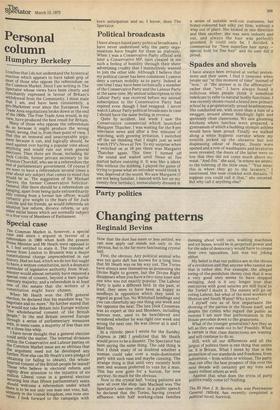Party politics
Changing patterns
Reginald Bevins
Now that the dust has more or less settled, we can now apply our minds not only to the obvious, but to the far more fascinating crystal ball.
First, the obvious. Any political animal who was not quite daft has known for a long time that Mr Heath was on his way out. The Tories have always seen themselves as possessing the Divine Right to govern, but the Divine Right disappears when you have a two-time loser and one who was not exactly popular. The Labour Party is quite a different bird. In the past, at least, they seem to have been as happy as sandboys in opposition which they used to regard as good fun. No Whitehall briefings and you can cheerfully say one thing one week and the opposite the next. The late Dick Crossman was an expert at this and Members, including famous men, used to be bewildered and wondered whether he was right one week and wrong the next one. He was clever at it and I liked him.
In a vitriolic piece I wrote for the Sunday Express in 1965 t predicted that Mr Heath would prove to be a disaster. The Spectator has been saying the same thing. The odd thing is that I think many of us doubted whether a woman could take over a male-dominated party with such ease and maybe cunning. The strange thing is that until very recently both men and women preferred to vote for a man. This has now gone for a burton, for now anyway. So much for the obvious.
Now to the crystal ball. Voting patterns are now all over the shop. lain Macleod was The Spectator's one-time editor. In a public speech he declared that the Tories, having created affluence, with half working-class families messing about with cars, washing machines and ice boxes, would be in perpetual power and for the sake of democracy would have to create their own opposition. lain was not joking either.
My belief is that our politics are in the throes of a revolution and that anyone who cannot see that is rather dim. For example, the alleged swing-of-the-pendulum theory (not that it was a very good one) seems to have stopped swinging. And is it any longer true that executives with good salaries are still loyal to the Tories? I doubt it. The miners will go on voting Labour, but what of the steel workers of Shotton and South Wales? Who knows?
I myself rate as of first importance the showing of the parties in the House itself, and despite the cynics who regard the public as morons I am sure that performances in the House percolate down to the grassroots. What of the younger generation? Are they as left as they are made out to be? Possibly. What is certain is that class distinctions are waning and will continue to do so.
Still, with all our differences and all the jargon of politics there is one thing that unites us: it is Britain. What I mean by that is the protection of our standards and freedoms, from subversion — from within or without. The party that can offer the best prospect of this over the next decade will certainly get my vote and many million others as well.
Against that what does the trivia of party politics really come to? Nothing.
The Rt Hon J. R. Bevins, who was Postmaster General 1959-64, has recently completed a political novel, Survival.


































 Previous page
Previous page